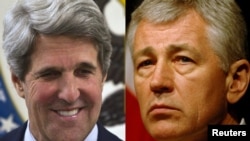News
- By RFE/RL
Kerry, Hagel Urge Senators To Back Syria Strikes
WATCH: U.S. Secretary of State John Kerry argues for military action against Syrian 'tyrant'
Testifying before the Senate Foreign Relations Committee on September 3, Secretary of State John Kerry said "the world is watching" to see whether the United States would respond to the "assault on conscience" of apparent chemical weapons attacks in Syria or stand by.
"We're here because against multiple warnings from the president of the United States, from the Congress, from our friends and all around the world, and even from Russia and Iran, the Assad regime -- and only, undeniably, the Assad regime -- unleashed an outrageous chemical attack against its own citizens. We're here because a dictator and his family's personal enterprise, in their lust to hold on to power, were willing to infect the air of Damascus with a poison that killed innocent mothers and fathers and hundreds of their children, their lives all snuffed out by gas," Kerry said.
He said any failure to do so could embolden terrorists, Iran, and North Korea. Defense Secretary Chuck Hagel said strikes would degrade the Assad regime's ability to carry out chemical attacks.
Hagel emphasized that no U.S. troops would be deployed in Syria and that the president was not seeking authorization to carry out regime change.
"The president has made clear that our military objectives in Syria would be to hold the Assad regime accountable, degrade its ability to carry out these kinds of attacks, and deter the regime from further use of chemical weapons. The Department of Defense has developed military options to achieve these objectives, and we have positioned U.S. assets throughout the region to successfully execute this mission. We believe we can achieve them with a military action that would be limited in duration and scope," Hagel said.
The hearing was briefly interrupted by a protester.
Earlier, Obama had expressed confidence that he will be able to work with Congress to pass a resolution authorizing "limited" military intervention in Syria.
"The key point that I want to emphasize to the American people [is that] the military plan that has been developed by the joint chiefs [of staff] -- and [which] I believe is appropriate -- is proportional," Obama said at the White House on September 3 during a meeting with leaders from both the main U.S. political parties in the House of Representatives and Senate.
"It is limited. It does not involve boots on the ground. This is not Iraq and this is not Afghanistan. This is a limited, proportional step that will send a clear message not only to the [Syrian President Bashar] al-Assad regime, but also to other countries that may be interested in testing some of these international norms, that there are consequences."
Obama indicated that he is proposing military action that would degrade Assad's capacity to use chemical weapons.
A vote in Congress on the issue is expected next week.
House Republican Speaker John Boehner, who attended the White House meeting, backed Obama's call for an intervention.
"I believe that my colleagues should support this call for action," he said. "We have enemies around the world that need to understand that we are not going to tolerate this type of behavior. We also have allies around the world and allies in the region who also need to know that America will be there and stand up when it's necessary."
House Democratic Leader Nancy Pelosi said she did not believe Congress will reject a resolution calling for force, saying deterring the use of weapons of mass destruction was a "pillar of our national security."
The United States says Assad's regime carried out a poison-gas attack near Damascus on August 21 in which Washington says more than 1,400 people were killed.
France, which has emerged as the main U.S. ally in the Syria crisis, released an intelligence report on September 2 that also blamed Assad's regime for the attack.
UN Secretary-General Ban Ki-moon warned on September 3 that any "punitive" action against Syria could unleash more bloodshed in the country's civil war.
He added that if chemical weapons have been used in Syria, the UN Security Council should take action against what would be "an outrageous war crime."
Russia, which along with China has blocked UN Security Council resolutions against Assad, said on September 2 that it remains totally unconvinced the attack was carried out by Assad's forces.
Beijing has warned of the risks of unilateral military action.
"China supports the United Nations conducting an independent, fair, objective, and professional investigation," Foreign Ministry spokesman Hong Lei told reporters on September 3. "What actions the international community should take next should be determined by the results of the investigation, which should clarify whether or not someone used chemical weapons in Syria, and who used the chemical weapons. The results should be the premise and precondition for any action taken by the international community for the next step."
The Syrian government has repeatedly denied using chemical weapons.
In an interview published in a French daily on September 2, Assad said the Middle East was a powder keg and that a Western attack on Syria could push the entire region into chaos.
With reporting by AP, AFP, and dpa
More News
Serbia Approves New Government Led By Duro Macut, A Doctor
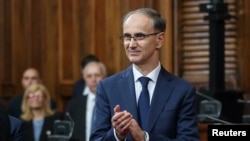
Serbia has appointed a new government led by Duro Macut, a doctor and academic with no prior political experience, amid street protests that have rocked the Balkan nation.
The 61-year-old Macut was backed by 153 lawmakers in the 250-seat parliament during the April 16 vote. Macut's cabinet will include 30 ministers, including 10 newcomers. A total of 199 MPs voted, with 46 against.
Macut was handpicked by President Aleksandar Vucic, who has led the country since 2017. Vucic’s Serbian Progressive Party (SNS) controls 112 seats in parliament.
In his inaugural address, Macut said Serbia was "tired of division and blockades" and called for the "harmonization of society" through dialogue, tolerance, and a shared value system. He announced that his immediate priority would be ensuring the normal functioning of schools and universities.
The new cabinet follows the resignation of former Prime Minister Milos Vucevic, who stepped down on January 28, a day after members of the SNS assaulted a student protester in Novi Sad. Vucevic is president of the SNS. His resignation was formally acknowledged by parliament on March 19.
Vucevic's departure came amid growing anti-government protests spearheaded by students who are demanding accountability for the deaths of 16 people in the collapse of a railway station canopy in Novi Sad on November 1.
The protests over the accident have evolved into a broader movement opposing what demonstrators say is the crumbling rule of law and systemic corruption under Vucic, who experts say rules the country with a tight grip. The students have blocked dozens of faculties across Serbia since late November.
Macut, a respected endocrinologist, is deputy director of the Clinic for Endocrinology, Diabetes and Metabolic Diseases at Serbia's University Clinical Center. He is also a full professor at the University of Belgrade Medical School and lectures in Athens and Skopje.
He heads the Serbian Society for Reproductive Endocrinology and is an internationally recognised expert on polycystic ovary syndrome. Macut currently serves on the Executive Board of the European Society of Endocrinology.
Zoran Stojiljkovic, a professor at the Faculty of Political Sciences, sees the appointment of Macut as little more than a tactic by Vucic to buy time.
"The government is responsible for triggering this political and social crisis, and what it's offering as a way out doesn’t guarantee either stability or permanence," he told local media.
Bojan Klacar, executive director of the Centre for Free Elections and Democracy, said Macut’s nomination is a direct response to the student protests that remain “very much alive and vital.”
“If the protests begin to subside, this choice could benefit the ruling Serbian Progressive Party,” Klacar said. “In that case, the opposition and those supporting the students will struggle to justify why they wouldn’t sit at the table with such a prime minister.”
He added that Macut, a university professor, should be a “credible interlocutor” for the protesting students.
Kyiv Cites 'Significant Progress' In Talks With US On Partnership Deal, Rare Earth Minerals

Ukrainian Economy Minister Yulia Svyrydenko said there has been "significant progress" in negotiations with the United States toward a comprehensive economic partnership agreement that includes a deal on rare earth minerals.
In a post on X published on April 16, Svyrydenko said that while teams from both sides will continue working on specific points in the agreement, "a lot has already been worked out."
"We have now agreed with the American side to record this progress in the relevant memorandum of intent. We are preparing to complete the formalization of the agreement in the near future," she wrote, giving no further indication of the timing.
US President Donald Trump's administration has made securing rare earth supply chains a strategic priority, especially as global competition with China intensifies. The deal with Ukraine is seen in Washington as a way to diversify critical mineral sources and reduce US dependency on Chinese exports.
It's also seen by Trump as a way to be compensated for billions of dollars in support Washington has supplied to Ukraine in its war with Russia, sparked by Moscow's February 2022 full-scale invasion of its neighbor.
Talks on a cease-fire in the conflict have been occurring in parallel to the economic partnership talks.
Svyrydenko said that once finalized, the draft will require ratification by the Ukrainian parliament, the Verkhovna Rada to ensure the agreement aligns with Ukraine's long-term national interests.
"It [the agreement] will create opportunities for investment and development in Ukraine and establish conditions for tangible economic growth for both Ukraine and the United States," she said.
Svyrydenko's statement came a day after President Volodymyr Zelenskyy described recent US-Ukraine discussions as "positive," particularly in the context of a parallel, high-stakes negotiation over critical minerals -- strategic resources essential to modern technologies and national security.
Zelenskyy confirmed that multiple meetings were ongoing and encouraged continued public attention.
However, the negotiations have come against the backdrop of lingering tensions between Trump and Zelenskyy.
On March 30, Trump publicly accused Zelenskyy of attempting to walk away from the critical minerals deal, warning such a move would trigger "serious consequences."
The accusation followed a report by Bloomberg News that Ukraine was preparing to propose key changes to a draft agreement, particularly regarding rare earth minerals -- resources vital for electronics, defense systems, and renewable energy technologies. The revisions reportedly promise to increase American investments in Ukraine's mining sector.
According to The Financial Times and Bloomberg, the United States is pushing for a new strategic framework that would secure access to Ukraine's energy assets and deepen bilateral cooperation across critical sectors.
As Kyiv and Washington edge closer to formalizing both the broader economic partnership and the strategic minerals agreement, these talks could reshape Ukraine's postwar economy and the geopolitical balance of energy and technology supply chains in Europe and beyond.
With reporting by Bloomberg and Financial Times
- By RFE/RL
Iran Says It's Ready To Address US Concerns But Not Negotiate Nuclear Enrichment
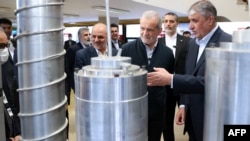
Tehran is ready to ease US concerns over its nuclear activities but scrapping uranium enrichment is off the table, Foreign Minister Abbas Araqchi said as the two sides prepare for a second round of talks this weekend over Iran's nuclear program.
Araqchi told reporters after a weekly cabinet meeting in Tehran on April 16 that Iran's enrichment is a "real, accepted matter."
"We're ready to build confidence in response to possible concerns, but the principle of enrichment is nonnegotiable," he said, days ahead of the second round of talks with the United States on April 19, which Iran's state broadcaster announced would take place in the Italian capital, Rome, and not in Oman as previously thought.
Araqchi's comments came in response to a statement by US Special Envoy Steve Witkoff on April 15 saying Iran "must stop and eliminate its nuclear enrichment and weaponization program."
But hours earlier, Witkoff had told Fox News that the Donald Trump administration was seeking to cap Iran's uranium enrichment at 3.67 percent -- the limit set in the 2015 nuclear deal that Trump abrogated in 2018.
"Iran must not possess nuclear weapons, and it should not enrich uranium beyond 3.67 percent," Witkoff said.
His apparent reversal came after a conservative backlash on social media, with the administration being accused of repackaging the 2015 deal, which is formally known as the Joint Comprehensive Plan of Action (JCPOA).
"We applaud Special Envoy Witkoff's statement," wrote Mark Wallace, chief executive of United Against Nuclear Iran (UANI), a US-based nonprofit, after Witkoff changed his tone.
"It is clear under the Trump Doctrine that Iran must verifiably dismantle its nuclear program or the US and Israel will do so," said Wallace, a former US diplomat.
Araqchi, who will travel to Moscow on April 17, noted Witkoff had made "different comments" since the conclusion of the first round of talks but added Washington's "true position must be clarified at the negotiating table."
Trump has made it clear Iran cannot be allowed to acquire nuclear weapons, but he has not explicitly commented on whether that involves curbing Iran's nuclear program or fully dismantling it. In the meantime, his administration has been sending out mixed messages.
Quoting an unnamed US official, the Axios news website on April 16 attributed the lack of clarity to ongoing internal discussions.
"The Iran policy is not very clear mainly because it is still being figured out. It is tricky because it's a highly politically charged issue," the official said, according to Axios.
Former US diplomat and nonproliferation expert Mark Fitzpatrick said a deal would be unlikely unless the Trump administration relaxed its position.
"Trump would have to change the position of no enrichment to a position of low enrichment," he told RFE/RL's Radio Farda.
"Iran is not going to go to a 'no enrichment' and it's certainly not going to accept it, but it would be willing to negotiate the levels of enrichment. And yes, this would be like the negotiations under the JCPOA," he added.
With reporting by Hannah Kaviani of RFE/RL's Radio Farda
Serbian Student Cyclists Reach Strasbourg, Ending Trek To Highlight Anti-Government Protests
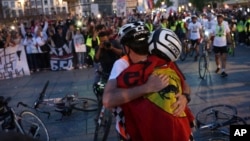
Serbian university students who have been on a cycling tour across Europe for nearly two weeks to draw attention to protests against corruption in their home country arrived on April 15 in Strasbourg, France, seat of the European Parliament.
Around 80 student cyclists rode on to Strasbourg's main square and were greeted with shouts of "Pump, pump" before bottles of champagne were uncorked in celebration.
The group had left Novi Sad on April 3 and traveled more than 1,300 kilometers through heavy rain and chilly temperatures to show European institutions the "perseverance and dedication of students in the fight for justice" in Serbia, they said.
The students say their fight is being overlooked in much of Europe and by the news media in Serbia, which is seeking membership in the European Union but has been accused of backsliding in democratic freedoms and the rule of law.
The students declared their cycling tour a success after being well-received in Budapest, Vienna, and in towns along their route through Hungary, Slovakia, Austria, and Germany on their way to France.
“I think that this protest action is a full success,” one of the cyclists said after arriving in Strasbourg on a live N1 TV broadcast. “I think we have woken up Europe.”
The EU's enlargement chief backed the protesters' calls to tackle corruption and boost the rule of law.
"Serbia has to be brought back on the European track," Commissioner Marta Kos said in an interview with the European Newsroom consortium.
"What we are demanding from Serbia on the way of the EU accession is nearly exactly the same as what the protesters in Serbia are demanding," she said, pointing to issues such as "rule of law, anti-corruption, and public procurement."
The cyclists said they wanted to draw attention to the deadly collapse of a railway station cement canopy in Novi Sad in November that killed 16 people. The incident triggered nationwide demonstrations as protesters blamed the government for corruption and poor oversight.
The students are demanding justice for the victims of the collapse and an end to government pressure and violence against protesters.
They have called on the government to release all documents related to construction work at Novi Sad's railway station. The authorities claim they have made public all “available documents,” but protesters reject that claim.
Almost daily street demonstrations have rattled the Balkan nation. In late January, Prime Minister Milos Vucevic resigned.
President Aleksandar Vucic on April 6 named Djuro Macut, a little-known medical professor, as prime minister-designate amid the political crisis.
Vucic, one of the founders of the ruling Serbian Progressive Party, which has been in power since 2012, presented it as a "movement of great change." But he has been accused of stifling democratic freedoms while maintaining close links with Russia and China.
Vucic and his pro-government media have accused the students and their professors of working with unidentified Western security services against the state to remove him from power together. He has not provided any evidence for his claims.
Student-led protesters on April 14 temporarily blocked the entrances to national broadcasters Radio Television of Serbia (RTS) in Belgrade and Radio Television of Vojvodina (RTV) in Novi Sad, accusing the broadcasters of ignoring their movement.
With reporting by AP and AFP
US Lifts Sanctions Against Member Of Orban's Cabinet
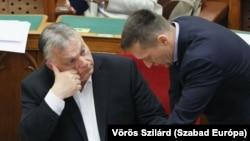
The United States on April 15 lifted sanctions imposed in January on the head of Hungarian Prime Minister Viktor Orban's cabinet, Antal Rogan, over accusations of corruption and cronyism.
A statement posted on the Treasury Department website said Rogan had been deleted from the sanctions list.
Secretary of State Marco Rubio on April 15 spoke with Hungarian Foreign Minister Peter Szijjarto and informed him of the move, State Department spokesperson Tammy Bruce said in a statement.
Rubio told Szijjarto that Rogan had been removed from the Treasury Department’s Specially Designated Nationals and Blocked Persons List, Bruce said, noting that continued designation was inconsistent with US foreign policy interests.
The two also discussed strengthening US-Hungary alignment on critical issues and opportunities for economic cooperation, Bruce said.
Orban and his Fidesz party have been among US President Donald Trump's most vocal supporters in Europe.
Washington earlier this year announced sanctions against Rogan for alleged involvement in corruption, saying he had “used his role to enrich himself and those loyal to his party,” the department said in a news release on January 7.
Rogan “orchestrated schemes designed to control several strategic sectors of the Hungarian economy” and skimmed the proceeds from the sectors for himself and loyalists to the Fidesz party, the department said when it announced the sanctions.
The US ambassador to Hungary at the time, David Pressman, said the “systemic corruption...is affecting Hungary's decision-making on issues that impact the security of the United States of America and our allies."
Pressman stepped down before Trump was inaugurated on January 20.
Orban’s government, which had called the sanctions against Rogan a "personal revenge of the ambassador," hailed the April 15 announcement that sanctions had been lifted as a "clear sign that the winds have changed in Washington."
Government spokesman Zoltan Kovacs said on X that the change "confirms a shift in US policy with President Trump's return, undoing what Hungary sees as unjust actions taken out of spite."
The United States previously said that throughout Rogan's tenure as a government official, he had orchestrated Hungary’s system for distributing public contracts and resources to cronies loyal to himself and Fidesz.
He was designated under the Global Magnitsky Human Rights Accountability Act, which targets perpetrators of serious human rights abuses and corruption around the world.
The department noted in January that public sector corruption in Hungary has been worsening for more than a decade, leading to Hungary receiving the lowest score of any European Union member state on Transparency International’s 2023 Corruption Perceptions Index for the second consecutive year.
It also said whistleblowers in Hungary have criticized the government for operating a kleptocracy with a notable lack of transparency and equity in public and private expenditure deals made between administrators such as Rogan and loyalist business leaders.
"Hungary’s failure to address transparency issues in its public procurement mechanisms has most recently led to a loss of over 1 billion Euros in future funding from the European Union, disadvantaging Hungarian citizens,” the department said in announcing the sanctions against Rogan.
With reporting by AFP and Reuters
Russian Journalists Handed Prison Terms For Alleged Ties To Navalny
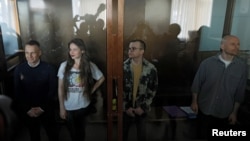
Four Russian journalists have been sentenced by a Moscow court to 5 1/2 years in prison each for their activities linked to the late opposition leader Aleksei Navalny’s Anti-Corruption Foundation (FBK), which Russian authorities have designated as an "extremist organization."
The journalists -- Antonina Favorskaya, Sergei Karelin, Konstantin Gabov, and Artyom Kriger -- were convicted after a closed-door trial for their contributions to YouTube channels affiliated with FBK before it was outlawed in 2021.
The court on April 15 also barred the defendants from working as journalists for three years after their release.
After the verdicts and sentences were pronounced, the journalists' supporters started applauding and chanting: "Guys, you are the best!"
Kriger told supporters: "Everything will be okay, guys, do not worry, sooner or later all this will be over. Those who sentenced me will for sure be convicted themselves."
Bailiffs then started shouting at Kriger and cleared the courtroom.
All four journalists have repeatedly denied the charges.
The trial, which started in early October 2024, was held behind closed doors with supporters and journalists only allowed to attend the reading out of the verdicts and sentences.
Favorskaya and Kriger are reporters for the independent outlet SOTAVision, itself labeled a “foreign agent” by the Russian government.
'Independent Journalist Is Equated With Extremism'
Gabov and Karelin are freelance journalists who have contributed to major international media organizations, including Reuters and the Associated Press. Gabov has also contributed to Radio Liberty, Radio Free Europe's Russian-language service.
"I have never been a member of any political party and always considered it my duty as a journalist to objectively express the opinions of people with diverse views to help them be heard by the authorities," Gabov said in his final statement to the court.
“Independent journalism [in Russia] is equated with extremism.”
Karelin stressed in his final statement that the channel he was accused of working with wasn't outlawed as extremist at the time he contributed to it.
“Remorse is considered to be a mitigating circumstance. It’s the criminals who need to have remorse for what they did. But I am in prison for my work, for the honest and impartial attitude to journalism, FOR THE LOVE for my family and country,” he said in a written statement to the court.
The prosecution had sought up to six years in prison for each defendant. The trial was closed to the public, with authorities citing warnings from Russia’s Center for Combating Extremism, which claimed the FBK might attempt to disrupt proceedings.
The sentencing is part of a broader crackdown on journalists and former associates of Navalny, who died in prison in February 2024 under disputed circumstances while serving a 19-year sentence on charges widely regarded as politically motivated.
His death prompted international outrage and intensified scrutiny of Russia’s treatment of political prisoners and independent media.
Human rights organizations report that dozens of journalists are currently detained in Russia on similar charges, as the government continues to tighten control over dissenting voices.
Ukraine Replaces Regional Governor As Sumy Buries More Victims Of Russian Strike

Ukraine's government approved the dismissal of the military governor of the Sumy region for holding an award ceremony that appears to have been the target of a Russian air strike that killed 35 people, including two children.
Volodymyr Artyukh, the head of the Sumy Regional Military Administration, is expected to be relieved of his position once President Volodymyr Zelenskyy signs the approval, confirmed by the cabinet on April 15, government spokesman Taras Melnychuk said.
Artyukh will be replaced by Oleh Hryhorov, a former law enforcement official.
The decision comes amid a public outcry over an apparent military award ceremony held in Sumy just hours before the strike on April 13.
Russian forces launched two ballistic missiles -- one equipped with cluster munitions, according to Ukrainian officials -- at the center of the city, injuring more than 100 people along with the 35 deaths.
Residents of Sumy on April 15 buried more of those killed in the attack in emotional ceremonies.
"My sister died in the attack. If I was handed a gun, I’d start killing Russians on the [front line]. I’m fed up with them. Please, stop. I can’t take it anymore," said one grief-stricken relative at the funeral of two of the victims.
A 'Horrible Thing'
Officials from around the world condemned Russia and its president, Vladimir Putin, for the attack, which fell on Palm Sunday as many in the city marked one of the most religious days in the Christian calendar.
US President Donald Trump, who has made ending the war a top foreign policy priority since taking office less than three months ago, called the Russian strike on Sumy a "horrible thing."
But Bloomberg News reported on April 15 that the United States told its allies that it won't endorse a statement condemning Russia in the attack because it does not want to impact a peace process it is trying to bring the parties to sign to end Europe's largest conflict since World War II.
NATO chief Mark Rutte, in Odesa on April 15, said the alliance's support is "unwavering."
Calls for the Artyukh removal came after Artem Semenikhin, mayor of Konotop—the second-largest city in the Sumy region -- publicly accused the governor of organizing the ceremony honoring soldiers from the 117th Territorial Defense Brigade at the Sumy Congress Center.
"He [Artyukh] held an award ceremony for our heroes from the 117th Brigade right here. Everyone knows about it. It's not true that nothing was happening. It was. Thank God no soldiers were hurt -- they were in a shelter. But [the Russians] used a cluster bomb to cause as many civilian casualties as possible," Semenikhin said in a video statement recorded on the day of the attack.
In a subsequent interview with public broadcaster Suspilne, Artyukh acknowledged he had attended the event but denied organizing it.
"It wasn't my initiative. I was invited," he said.
The Russian Defense Ministry claimed the target of the strike was a "Ukrainian command staff meeting," while Russian Foreign Minister Sergei Lavrov alleged, without providing evidence, that NATO military personnel were present.
Ukrainian authorities have neither confirmed nor denied the presence of an army event in Sumy the day of the attack.
Ukrainian lawmaker Maryana Bezuhla stated on social media that there had been a leak of information concerning the ceremony.
EU Looks To Tighten Visa Rules: 61 Countries Face Visa-Free Travel Overhaul
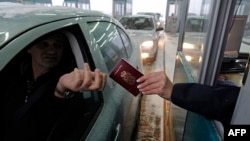
The European Union looks set to sharpen its visa suspension mechanism later this year, making it easier for Brussels to revoke visa-free travel for citizens of the 61 countries that currently enjoy it -- including all the EU hopefuls in the Western Balkans, as well as Georgia, Moldova, and Ukraine.
The proposal to list more reasons for suspending visa-free travel was initiated by the European Commission back in 2023, and the Council of the EU -- which represents the 27 member states –- already adopted its position on the matter a year ago. However, due to the European Parliamentary elections in June 2024 and a heavy backlog of legislation, the European Parliament only recently obtained its negotiation mandate.
Last week, the first trialogue between the three institutions took place on the proposed legislation, with the goal of reaching an agreement during the Polish Presidency of the EU Council, which runs until the end of June. If all goes well, the new legislation should be up and running in early autumn.
Why Is This Happening Now?
Essentially, the bloc is becoming much more hard-nosed about visa liberalization, reflecting a broader shift: first, to combat any form of illegal migration into the EU; and second, to potentially use visa policy as a political tool to pressure third countries.
Visa liberalization -- which in this case includes all EU member states except Ireland, as well as non-EU countries Iceland, Liechtenstein, Norway, and Switzerland -- has long been one of Brussels' most significant political carrots, particularly for countries in its neighborhood.
It allows nationals from third countries to visit the EU for up to 90 days in any 180-day period without a visa. Kosovo was included on the list in early 2024 and Georgia and Ukraine in 2017 -- moves that were celebrated in all these countries.
To threaten to withdraw the privilege can therefore be seen as a real stick.
The current suspension mechanism, in place since 2018, can be triggered in cases of clear abuse -- for example, a surge in third-country nationals overstaying the 90-day limit or using the liberalization of travel to seek asylum in the EU. So far, the bloc has only suspended visa liberalization once: first temporarily, then permanently, for the South Pacific nation of Vanuatu.
So, what changes are likely in store? Broadly speaking, there are four key areas of change, as Brussels aims to make the visa suspension mechanism a more credible deterrent. First, visa liberalization could be suspended if there is a perceived lack of alignment between a visa-free third country and the EU's general visa policy.
This was the case in 2022, for example, when Serbia allowed visa-free travel for citizens of countries such as Burundi, India, and Cuba. Brussels suggested that many of those individuals were using Serbia as a backdoor into the EU. After pressure from the European Commission, Belgrade dropped some of these arrangements. Under the proposed legislation, however, such behavior could be punished more readily.
Hybrid Threats
Another reason for suspending visas is so-called hybrid threats. While still rather theoretical, this provision is inspired by cases such as Russia and Belarus, which the EU has accused of transporting migrants from Africa and Asia to EU frontiers, like Poland and Lithuania's borders.
Now, the EU's visa facilitation agreements with both Moscow and Minsk have already been suspended for several years, due to Russia's invasion of Ukraine and Belarusian strongman Aleksandr Lukashenko's crackdown on the opposition. However, if another visa-free country attempts a similar tactic, the new mechanism could be triggered in response.
Thirdly, if a country operates an investor citizenship scheme -- allowing individuals to buy citizenship without any genuine link to that country -- then visa liberalization with the EU could also be halted in the future.
However, the fourth new ground for suspension is perhaps the most interesting one, as it relates to the EU's political relations with third countries. The draft legislation states that the suspension mechanism can be triggered in cases of “serious human rights violations and abuses" or “serious breaches of international law and standards, including human rights law and noncompliance with international court decisions and rulings."
'Democracy Criterion'
If you ask EU officials, their reading has always been that a “democracy criterion" exists when it comes to visa liberalization -- but it has never been clearly spelled out what exactly this entails.
Another interesting and new aspect is that triggering the mechanism in this case should be the exclusive prerogative of the European Commission, after consultation with EU member states, as it deals with the external relations of the bloc.
Ultimately, however, it would still be up to the member states -- via a qualified majority -- to suspend visa liberalization with a third country. As EU officials put it, this remains “the nuclear option when all others have been exhausted," since the bloc is generally reluctant to penalize a country's entire population rather than its government.
That's why, earlier this year, the EU chose to suspend visa liberalization for Georgian diplomatic passport holders only, following democratic backsliding in the Caucasus country. Still, the option of targeting the entire population remains on the table -- and with the future expanded scope of the suspension mechanism, the bloc is clearly sharpening its toolbox.
- By RFE/RL
In Couched Comments, Khamenei Backs Iran-US Nuclear Talks
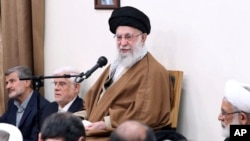
Iranian Supreme Leader Ayatollah Ali Khamenei appeared to back the continuation of nuclear discussions between Tehran and Washington, though he said he is neither "overly optimistic nor overly pessimistic" about the talks as they head toward a second round this weekend.
In his first public comments on the initiation of talks between Iran and the United States last weekend, Khamenei on April 15 said Iranian negotiators need to proceed with caution.
"A decision was made [to enter the talks] and has been carried out well in the initial steps. Going forward, we need to move carefully. Our red lines -- and the other side's -- are clearly defined," Khamenei said at a gathering of the senior members of the three branches of power.
"The negotiations may or may not lead to a result. We are neither very optimistic nor very pessimistic about these talks. Of course, we are very pessimistic about the other side, but we are optimistic about our own capabilities," he added.
Khamenei, who has the final say on all state matters, urged officials "not to tie the country's affairs" to the negotiations.
The first round of talks, which were mostly carried out indirectly, were held in Muscat on April 12, with the next round scheduled for April 19.
Italy was initially set to host the second round, but Iran later said Oman would continue to host the talks. None of the parties involved have elaborated on why the venue was changed.
Montenegro Releases Kazakh Rights Activist Smailova Awaiting Extradition Ruling

Kazakh women's rights activist Dinara Smailova was released by Montenegro's Higher Court in Podgorica on April 15, a day after she was arrested in the coastal town of Budva at the request of Kazakh authorities.
The court ruled that she may remain free while the extradition case proceeds, but ordered the confiscation of her passport to prevent her from leaving the country.
Authorities in Podgorica said on April 14 that Smailova's arrest was carried out "in accordance with an order by the investigative judge of the Higher Court," pending a review of the extradition request.
She is the founder of NeMolchiKZ (Don’t Be Silent KZ), a leading advocacy group fighting domestic and sexual violence in Kazakhstan.
Smailova applied for asylum in Montenegro in October 2023 and the decision is expected in the following months, her lawyer Dalibor Tomovic said on April 15.
"The request for asylum was submitted before the Kazakh government submitted a request for her extradition and the detention. So in the case that she is extradited to Kazakhstan, the fear of persecution is justified."
After leaving the court in Podgorica, Smailova thanked the supporters of NeMolchiKZ.
"You've been supporting us for about nine years, and that led to a women's revolution in Kazakhstan, where both men and women support our fight against domestic violence. Don't give up," Smailova said.
In December 2023, a Kazakh court issued a warrant for Smailova's arrest on charges of fraud, violating privacy, and spreading false information -- allegations that could carry a prison sentence of up to 10 years.
Human Rights Watch had earlier described the charges as "dubious" and part of a broader campaign to discredit her activism.
"Kazakh authorities appear to be on a fishing expedition, aggressively targeting Smailova in an effort to undermine her legitimate work defending victims of abuse," the group warned in February 2024.
Domestic violence remains a serious issue in Kazakhstan. According to local and international organizations, hundreds of women die every year as a result of domestic violence, and thousands more suffer abuse in silence due to societal stigma and institutional indifference.
In 2017, Kazakhstan decriminalized beatings and other acts causing "minor" physical harm, with the punishment reduced to an arrest, fine, or warning.
During a high-profile trial of a former government official who beat his wife to death, a law was introduced in April 2024 to close gaps in legal protections against domestic violence by criminalizing battery and intentional harm to health.
However, several human rights groups, including Smailova's organization, expressed concerns, saying the amendments do not go far enough.
Smailova's organization has provided critical support to survivors, including legal aid and public advocacy. Her outspoken criticism of the government's failure to protect women and children has drawn both praise and political backlash.
Montenegro's Council for Civilian Oversight of Police Work had cautioned Interior Minister Danilo Saranovic that Smailova would face persecution if returned to Kazakhstan.
The council likened Kazakhstan's increasing pressure on human rights defenders to similar tactics used by the Russian government and stressed that extraditing Smailova would contradict Montenegro's commitment to protecting human dignity and democratic values.
Smailova and her husband, fellow rights activist Almat Mukhamezhanov, have lived in self-imposed exile for several years and moved to Montenegro in 2023.
- By RFE/RL
Drone Attack On Kursk Kills 1, Injures 9, Russian Authorities Say
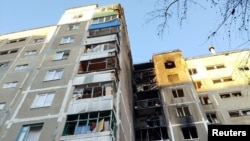
A Ukrainian drone attack killed an 85-year-old woman and injured nine people in the Russian city of Kursk near the border with Ukraine, regional authorities said on April 15.
"Kursk has been subjected to a massive enemy attack overnight," the Kursk regional administration said on Telegram.
Several apartments in a multistory residential building caught fire as a result of the drone attack, said acting Mayor Sergei Kotlyarov on Telegram. Residents have been evacuated to a nearby school, he added.
Drones also hit also an ambulance garage, damaging 11 vehicles, the region's administration said.
More than 20 blasts shook the city, according to Russia's Baza and SHOT Telegram channels, which often publish information from sources in the security services and law enforcement.
The reports could not be independently verified. There was no immediate comment from Ukraine. Both sides deny targeting civilians.
Ukrainian troops staged an incursion into the Kursk region in August, but Russian forces have been successful in recent months in pushing Ukrainian troops back across the border.
The attack on April 15 follows a Russian missile strike that left at least 34 people dead on April 13 in the Ukrainian city of Sumy, capital of the Sumy region, which borders Russia’s Kursk region.
Ukraine's state emergency service said two children were among those killed in the attack, which occurred as Ukrainians marked Palm Sunday. At least 117 others -- including 15 children -- were injured.
Officials from around the world condemned Russia and President Vladimir Putin on April 14.
European officials accused Russia of committing a war crime, while US officials from President Donald Trump to several Republican and Democratic Party lawmakers expressed horror at the death and destruction caused in the second major attack to kill Ukrainian civilians in 10 days.
With reporting by Reuters
Serbian Students Rally Against Protest Coverage In Front Of Public Broadcasters
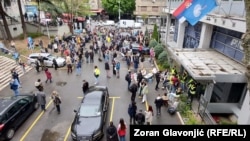
Serbian students staged demonstrations late on April 14 in front of the buildings of public broadcasters in Belgrade and Novi Sad to express their dissatisfaction with their reporting of protests that have taken place almost daily since the fatal collapse of a concrete at train station in November.
The students accused the national broadcasters -- Radio Television of Serbia (RTS) in Belgrade and Radio Television of Vojvodina (RTV) in Novi Sad -- of ignoring their movement and the protests.
"The public broadcaster is working against all of us," the students wrote on Instagram. They pitched tents outside RTS and RTV and vowed a prolonged blockade.
Police officers were deployed in Belgrade, but no incidents were reported.
Belgrade students took to social media without notice earlier on April 14 to call for a blockade of RTS at two locations in Belgrade.
There has been criticism that the broadcasters failed to cover dozens of Serbian cyclists who earlier this month traveled some 1,300 kilometers to the European Parliament in Strasbourg to draw attention to their country's ongoing anti-corruption campaign.
The protests started after the collapse of a concrete canopy at Novi Sad train station killed 16 people. The deadly collapse triggered nationwide demonstrations in Serbia by people who blamed the government for corruption and poor oversight.
Gatherings have taken place almost daily, drawing hundreds of thousands of participants in major cities. The broader movement is drawing attention to what they says is the crumbling rule of law and systemic corruption under President Aleksandar Vucic.
The pressure led to the resignation of the prime minister and the collapse of the government.
The President of the National Assembly of Serbia, Ana Brnabic, has scheduled a special session of the parliament for April 15 at which members of the new government are expected to be elected, according to the website of the assembly.
Aleksandar Vulin, who held the position of vice president in the previous government, is not on the proposed list of new ministers. Since Russia launched its full-scale invasion of Ukraine, Vulin has visited Russia and met with high Russian officials, including Russian President Vladimir Putin. Vulin has been under US sanctions since 2023 for allegedly facilitating Russian activities in the Balkans.
Vucic on April 12 rallied his supporters in Belgrade, announcing that he will form a new political movement in the face of the growing wave of protests.
Vucic insists the student-led protests are threatening peace and stability in the country and accuses organizers of being paid by "foreign intelligence agencies."
He told thousands of supporters during the April 12 rally that authorities must begin procedures "to restore order in the country" and that "full respect for the Constitution [must take place] to ensure the security of Serbia."
He said a new movement for the people and the state is required "because we need new energy and new strength, a new plan, not a plan until 2027, but until 2035."
With reporting by AFP
Hungary Passes Constitutional Amendment Recognizing Only Two Genders
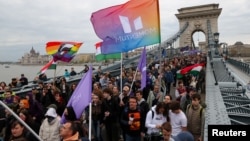
Hungarian lawmakers on Monday passed the 15th amendment to the Fundamental Law, as the constitution is called, restricting the right of LGBT groups to hold public events while recognizing only two genders: male and female.
The amendment was passed by a vote of 140 to 21, with deputies from the far-right Our Homeland Movement joining Prime Minister Viktor Orban's Fidesz party and its allies, the Christian Democrats.
Members and supporters of the opposition Momentum party tried to disrupt the vote by blocking the parliamentary parking lot and honking a horn during the plenary session. Opposition groups also protested against the amendment outside Parliament during the voting.
As a result of the vote, the Fundamental Law now stipulates that a person can only identify as either male or female. The law comes three months after US President Donald Trump, an ally of Orban, issued an executive order recognizing only two genders.
The Hungarian bill says the right of children to proper physical, mental, and moral development -- with the exception of the right to life -- takes precedence over all other fundamental rights, including the right to assembly. The Pride march, held annually in Budapest for some 30 years, can now be banned.
The new amendment also says Hungarians have the fundamental right to use cash and allows for the suspension of citizenship and the expulsion from Hungary of Hungarians who are also citizens of another country outside the European Union if they are deemed to pose a threat to public order and the country's national security.
The production, use, distribution, and promotion of drugs is also now constitutionally banned.
The ban on public LGBT events was the latest step by the Orban government opposing the rights of the LGBT community. Since Orban's return to power in 2010, the government has banned gay marriage, severely restricted the possibility for LGBT people to adopt children and has tried equating homosexuality with pedophilia.
Xi Eyes Inroads In Asia, Europe Amid Trump's Tariffs And US-China Tensions
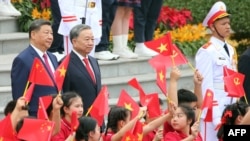
Chinese leader Xi Jinping called for upholding multilateral trade as he landed in Vietnam as part of a high-stakes tour of Southeast Asia's most export-reliant economies as he looks to capitalize on global trade tensions with the United States.
The three-country visit, which begins with a two-day state visit to Vietnam on April 14, will also take Xi to Malaysia and Cambodia as he aims to emphasize China as a stable partner in contrast to the United States, which has imposed and then suspended punishing tariffs across the region and roiled global markets.
"There are no winners in trade wars and tariff wars, and protectionism has no way out," Xi wrote in an article published in Vietnamese state media ahead of his visit, without mentioning the United States specifically.
The Chinese leader also urged strengthening coordination and cooperation through regional initiatives, such as the East Asia Cooperation and the Lancang-Mekong Cooperation, which he called necessary to "inject more stability and positive energy into a chaotic and intertwined world."
Beijing and Hanoi signed 45 agreements, although the contents of all the deals have not yet been disclosed. Xi expected to attend the launch ceremony for a new $8-billion railway project connecting Vietnam and China on April 15. The venture is part of China's Belt and Road Initiative (BRI), a global infrastructure development strategy.
While planned ahead of the announcement of global US tariffs, the tour now forms part of a broader Chinese charm offensive launched in the wake of a growing trade war that saw US President Donald Trump hit China with 145 percent tariffs and Beijing respond with a 125 percent tit-for-tat move on US goods.
Before receiving a 90-day reprieve on "reciprocal" US tariffs, Vietnam and Cambodia were hit with 46 percent and 49 percent tariffs, respectively, and both countries are walking a tightrope in their relations between China and the United States, both of which are important economic partners.
China is also looking for inroads in Europe amid the tariff tumult. Xi hosted Spanish Prime Minister Pedro Sanchez in Beijing on April 11, where he said China and the European Union should "jointly oppose unilateral acts of bullying."
Similarly, Chinese premier Li Qiang spoke with European Commission President Ursula von der Leyen last week when they both emphasized the need for a "strong reformed trading system, free, fair, and founded on a level playing field," according to a readout.
"US tariffs were seen as truly existential, and while we're in a pause on the retaliatory tariffs, there's still this pervading sense of uncertainty around the threat of future tariffs," said Kaitlyn Garman, a senior fellow at the Center for European Policy Analysis (CEPA).
"You can see short- and long-term scenarios where policy decisions will need to be assessed through the lens of the potential that this opens up another point of confrontation with the United States and risks an escalating trade war," she added.
Tariffs Ignite A Delicate Balancing Act in Southeast Asia
Trump has said his goal in unleashing tariffs is to eliminate the US trade deficit once and for all, which he says will help lure more manufacturing back to the United States, creating jobs at home and staunching the flow of US money to China.
But the tariffs also appear to be a negotiating tool for Washington to remake its trade relationships with much of the world.
Some 70 countries are said to currently be negotiating tariff relief with Washington, and US Treasury Secretary Scott Bessent said last week they should "approach China as a group" together with the United States.
Many countries across Asia, however, are also grappling with being slapped by soaring tariffs and debating how to respond in the event that they could be reinstated to their full level after the 90-day pause ends.
It's against this backdrop that Beijing is looking to gain ground with its strategic neighbors in Southeast Asia.
Vietnam and many others in the region have traditionally sought to avoid taking sides between China and the United States. Washington is a crucial export market for southeast Asia and a security partner that serves as a counterbalance to China's assertiveness in the disputed South China Sea.
However, trade in the region is closely intertwined with China, with countries from the regional bloc, the Association of Southeast Asian Nations (ASEAN), counting as the biggest recipient of Chinese exports last year, according to China's customs data.
Vietnam is in the process of looking to negotiate its trade relationship with the Trump administration and has already sent Deputy Prime Minister Ho Duc Phoc to Washington, who promised to buy more US goods, including defense systems, as it looks to avoid the 46 percent levy being reintroduced.
Exports to the United States account for 30 percent of Vietnam's gross domestic product (GDP) and the country has received a boost in recent years as many companies moved there from China to skirt tariffs imposed by Washington.
China Looks For Diplomatic Inroads Elsewhere
Beijing has cast a wide net as it has looked to capitalize diplomatically in the aftermath of US tariffs.
Last week, China held video calls with Malaysia, as well as Saudi Arabia and South Africa. Xi also vowed to deepen China's strategic partnership with Indonesia in a call with that country's president, Prabowo Subianto, on April 13.
Brussels also announced that it plans to host an EU-China summit in July, and the bloc said last week that it agreed to restart talks with Beijing to settle a dispute over Chinese electric vehicle (EV) imports, which the EU hit with tariffs in 2024.
Spanish Prime Minister Sanchez's recent visit to Beijing also made headlines when he called for Europe to review its relationship with China as it adapts to a new reality with the United States. Those comments were met with a rebuke from US Treasury Secretary Bessent, who warned that cooperating with Beijing would be "cutting your own throat."
Analysts say a rapprochement between Brussels and Beijing is not in the cards given that China's support of Russia amid its war in Ukraine has deeply damaged relations with the bloc.
But Trump's tariffs threats, as well disagreements over US diplomacy over how to end the war in Ukraine, are also leading European governments to adjust their foreign policies, which could see them forge closer trading partnerships with other "like-minded" partners in Asia like India, Japan, and South Korea, and elsewhere in Europe with Norway and Britain.
"Europe will invest into robustly promoting trade through a like-minded partners approach," said Reinhard Butikofer, a former Member of the European Parliament. "The European Union will pursue a very active trade policy and try to strike new trade deals."
- By RFE/RL
US Envoy Says Any Deal With Iran Needs Proof Of Nuclear Enrichment Purposes
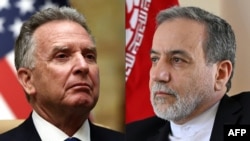
US Middle East envoy Steve Witkoff said on April 14 that any diplomatic agreement reached with Iran will be centered on details related to verification of the country's uranium enrichment and weapons programs.
"This is going to be much about verification on the enrichment program, and then ultimately verification on weaponization," Witkoff said in an interview on Fox News. "That includes missiles, the type of missiles that they have stockpiled there, and it includes the trigger for a bomb."
Tehran and Washington held the first round of nuclear talks over the weekend in Oman, both saying afterward that the talks were "positive" and "constructive."
The Iranian Foreign Ministry on April 14 said a second round of talks between the United States and Iran will be held in Oman on April 19.
Foreign Ministry spokesman Esmaeil Baghaei was quoted by Iranian state news agency IRNA as saying that it was decided that Muscat will continue to host the talks.
The comment contradicted a statement by Italian Foreign Minister Antonio Tajani, who said the talks would be held in Rome. Tajani said Italy received the request from the interested parties and announced Rome would be the venue.
Tehran also confirmed on April 14 that Foreign Minister Abbas Araqchi will visit Moscow ahead of the next round of talks.
Separately, Iran confirmed on April 13 that Rafael Grossi, director-general of the International Atomic Energy Agency (IAEA), will travel to Iran on April 16.
Araqchi met Witkoff met briefly after the first round of talks ended, adding to optimism relations between the two countries have taken a step forward.
US President Donald Trump has said he wants to ensure Iran will never acquire nuclear weapons. Iran insists its nuclear program is peaceful and wants a deal that leads to the lifting of sanctions that have battered its economy.
Trump has said that in the absence of a deal, there will be military strikes against Iranian nuclear facilities, with potential Israeli involvement.
Estimates suggest Iran could enrich sufficient uranium for a single bomb in less than a week and enough for several bombs within a month.
Meanwhile, the European Union on April 13 introduced sanctions on seven Iranian prison and judicial officials over Tehran's detention of nationals from the bloc.
EU foreign policy chief Kaja Kallas said the sanctions were in response to Iran's "state-sponsored hostage-taking" of European citizens.
On Iran's nuclear program, she said there was a need for a swift resolution because the October deadline to reimpose UN sanctions on Tehran is approaching.
European powers have warned Iran that they will trigger the 2015 nuclear deal's "snapback mechanism" to reimpose UN sanctions if it fails to reach a new deal with the United States.
With reporting by AP and AFP
Editors' Picks
RFE/RL has been declared an "undesirable organization" by the Russian government.
If you are in Russia or the Russia-controlled parts of Ukraine and hold a Russian passport or are a stateless person residing permanently in Russia or the Russia-controlled parts of Ukraine, please note that you could face fines or imprisonment for sharing, liking, commenting on, or saving our content, or for contacting us.
To find out more, click here.






